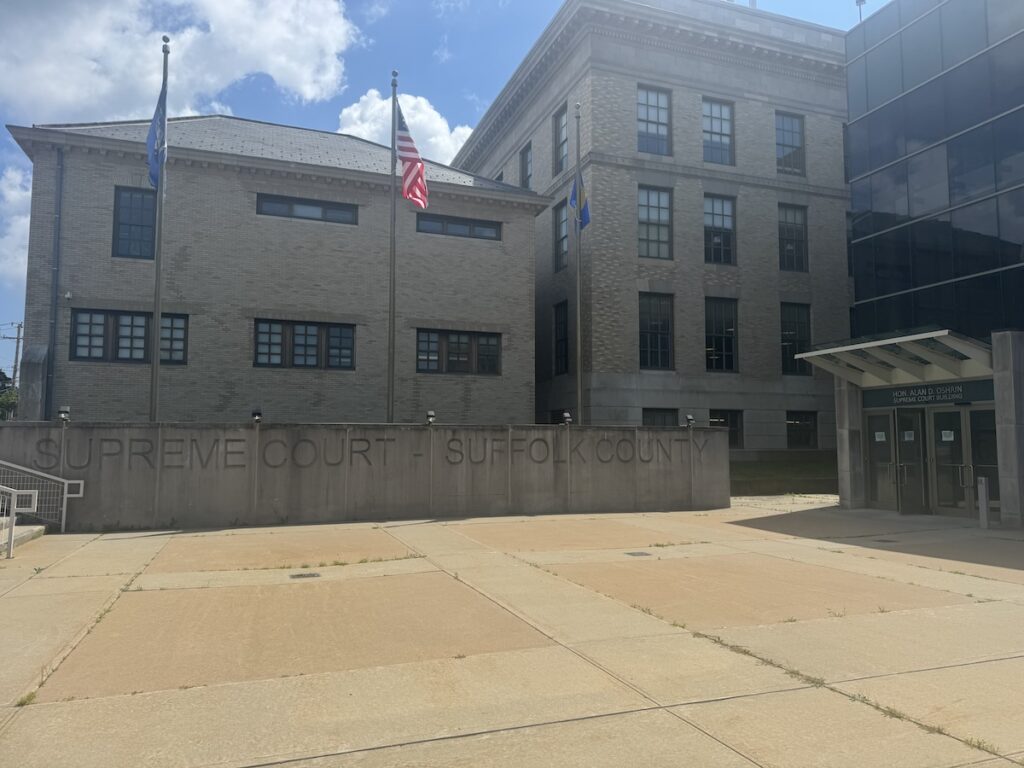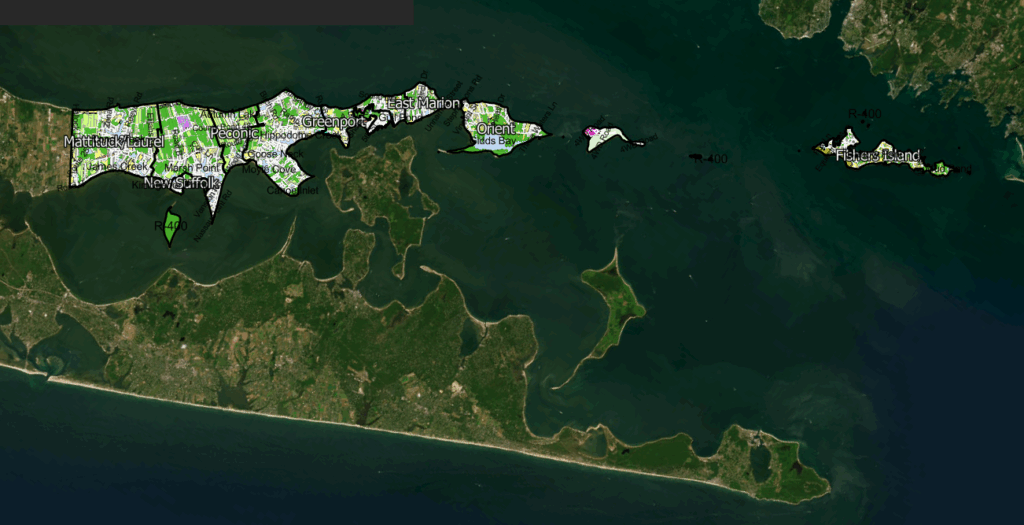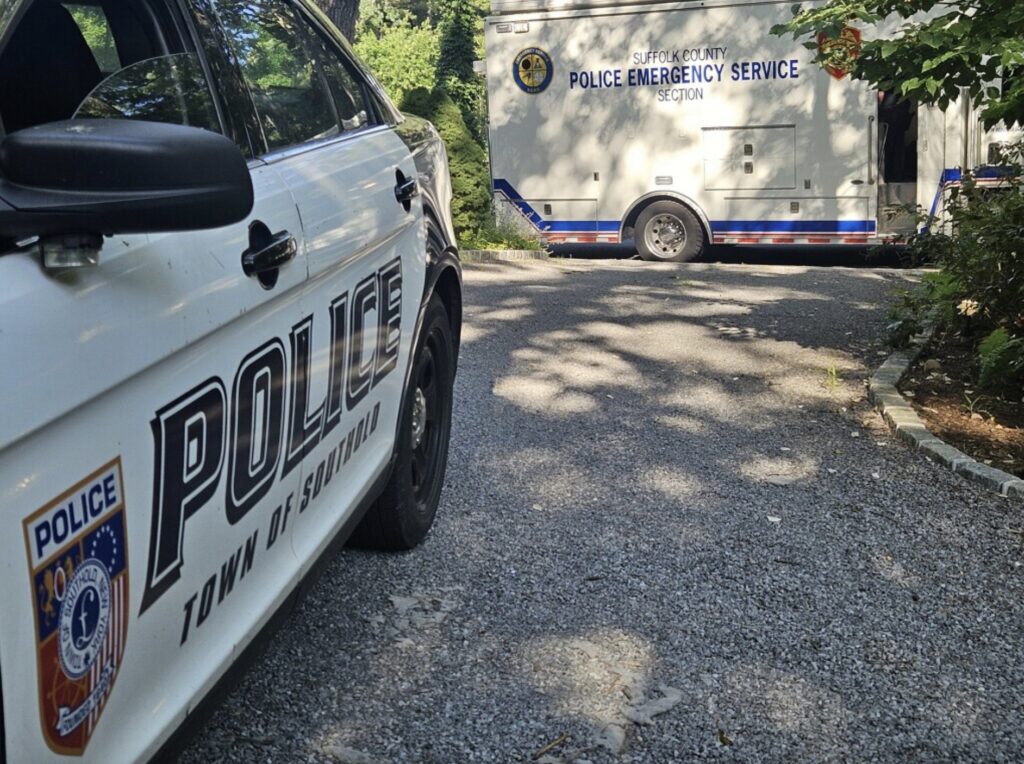Ferry district, Southold Town legal battle continues

The legal battle between the Fishers Island Ferry District and Southold Town has been peppered with fingers pointed over whose purview a Fishers Island property falls under. The property in question is where Southold police have been staying since January, when the district alleges they broke the locks off with crowbars.
In a July 16 letter to the Suffolk County Supreme Court, Police Chief Steven Grattan said the allegations that police cut the locks off and ejected people and property from 357 Whistler Ave. were “blatantly false.” He said that it was a “vacant, unoccupied, town-owned property.”
The $2 million lawsuit filed May 29 alleges that Southold Town, the Town Board and the police department violated due process, donative intent and state property law when they seized control of the residential property.
The 4.2-square-mile island, seven miles southeast of Connecticut’s coast, is governed by Southold Town and has 53 year-round residents. It is 11 miles northeast of Orient Point, accessible only by ferry or plane. It takes roughly two and a half hours to reach from Orient Point, using first the Cross Sound Ferry to New London, then The Fishers Island Ferry from New London to the island.
Southold police assumed policing duties on Fishers Island in November 2023, shuttling back and forth for five-day tours, after state troopers left the island over concerns about living conditions at their barracks at 752 Whistler Ave.
Scott Kreppein, a lawyer representing the town, contended that the 357 Whistler property is a town-owned building needed by the police while the original vacated barracks undergo renovations. He called the ferry district commissioners’ “lack of cooperation and disregard for the obvious public safety issue of needing a police presence on Fishers Island … astounding” and argued that it was appropriate for the Town Board to suspend their authority to manage the property through a Dec. 17, 2024, resolution.
That same resolution included intentions to return the property’s oversight to the ferry district once the 752 Whistler Ave. barracks renovations are completed.
On Dec. 30, 2024, the Ferry District Board unanimously rejected the proposed use of 357 Whistler Ave. as a temporary barracks and agreed to work with the town to find an acceptable alternative location to house police stationed on the island.
Keith Corbett, the lawyer representing the ferry district, told The Suffolk Times in a June 19 phone interview that a “suitable facility” across the street from the original barracks was provided as alternative to 357 Whistler for occupancy by officers stationed on the island.
According to a Suffolk County GIS System document, the town owns 357 Whistler. Mr. Corbett argued that the property — acquired by the town in a $695,000 September 1983 Surplus Land Acquisition from the United States — was financed in part by private donations with provisions the land be used for the district.
The district was created by the Fishers Island Ferry District Enabling Act in 1947 as a special improvement district that operates subject to Town Board authority and approval. Five locally elected ferry district commissioners provide day-to-day oversight for the island’s airport, ferry terminal and other town-owned properties within the district.
The act was amended in 1987 to stipulate that the Town Board shall not sell or transfer ownership of property intended for ferry district use without approval from a majority of commissioners or a majority of island voters. Mr. Kreppein argued that the use of the property as a temporary barracks is a “straightforward use” that benefits the district and does not involve a sale or transfer of property ownership.
If police are not able to use 357 Whistler Ave., Chief Grattan said their ability to provide police protection to the island would be “prejudiced.”
“I’m more concerned that there has to be a police presence on the island,” Judge Joseph Farneti said at a preliminary hearing between both parties on July 16 at Suffolk County Supreme Court in Riverhead.
The Town Board has clear authority to allocate properties and resources that have been reserved for the district to support other governmental functions, Mr. Kreppein said. He argued that the Town Board could charge a proportionate share of salaries and other expenses for policing the island against the ferry district’s budget.
“[The ferry district] does not have capacity to sue in its own name and … should not have had authority to retain counsel on its own,” Mr. Kreppein argued. He said it does “not have any independent existence or property rights.”
Mr. Corbett said that the Town Board approved the district’s Nov. 14, 2024, resolution to retain his office for “representation in corporate matters” on Nov. 19, 2024.
All ferry district land acquisitions, employee hires, construction work and contracts and leases are subject to Town Board approval. The district cannot set its own budget, Mr. Kreppein said, and has to submit its proposed budget for Town Board approval.
Hundreds of thousands of dollars were spent by the ferry district to renovate the 357 Whistler Ave. property, Mr. Corbett said in a previous interview with The Suffolk Times, in efforts to create a “vital revenue source for the district.” Mr. Kreppein argued that renovation expenditures would have had to have been approved by the Town Board, since the district is not supposed to control its own funds past a $1,500 petty cash account.
A 2017 Home Rule request submitted to the state legislature by the town which asked for an amendment to the Act to allow the district some degree of financial independence died in assembly. It would have allowed a district manager to be hired who would have been responsible for managing certain funds and increase the petty cash fund to $3,000 subject to commissioners’ review and audit by the state comptroller.
A revised bill was later reintroduced and passed, with any reference to the ferry district’s financial control removed. Instead, it increased the limit on the Town Board’s ability to issue bonds for ferry district purposes and making those bonds subject to permissive referendum.









